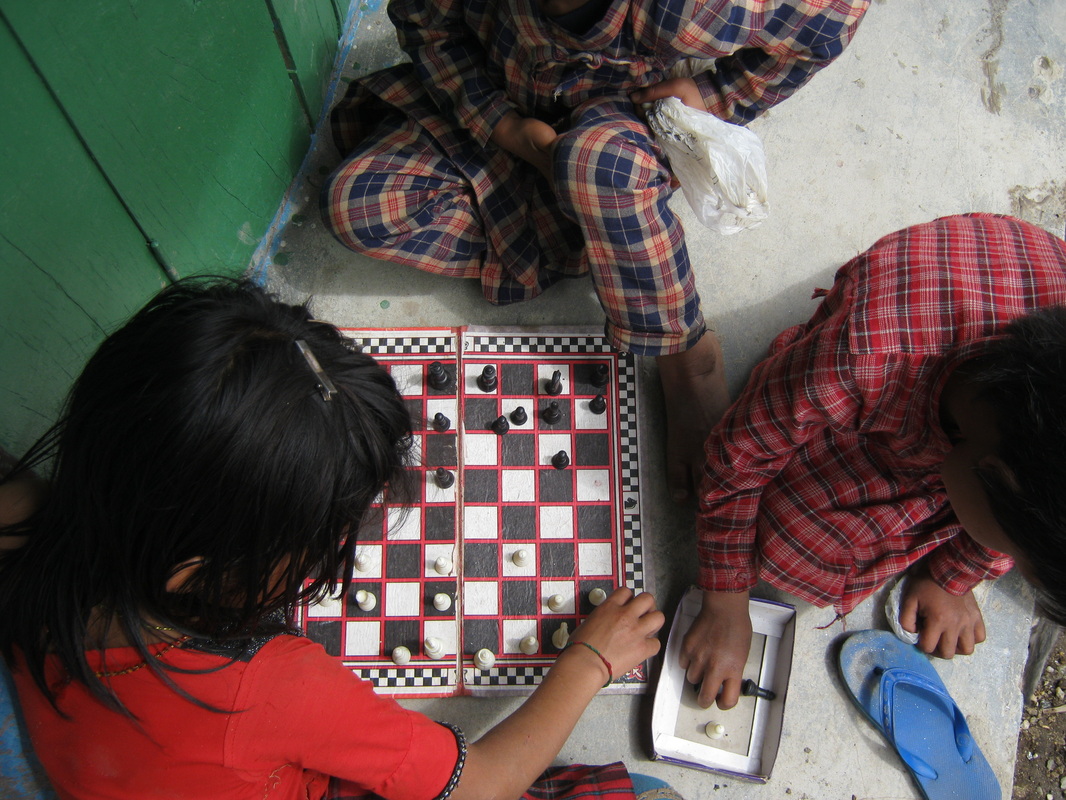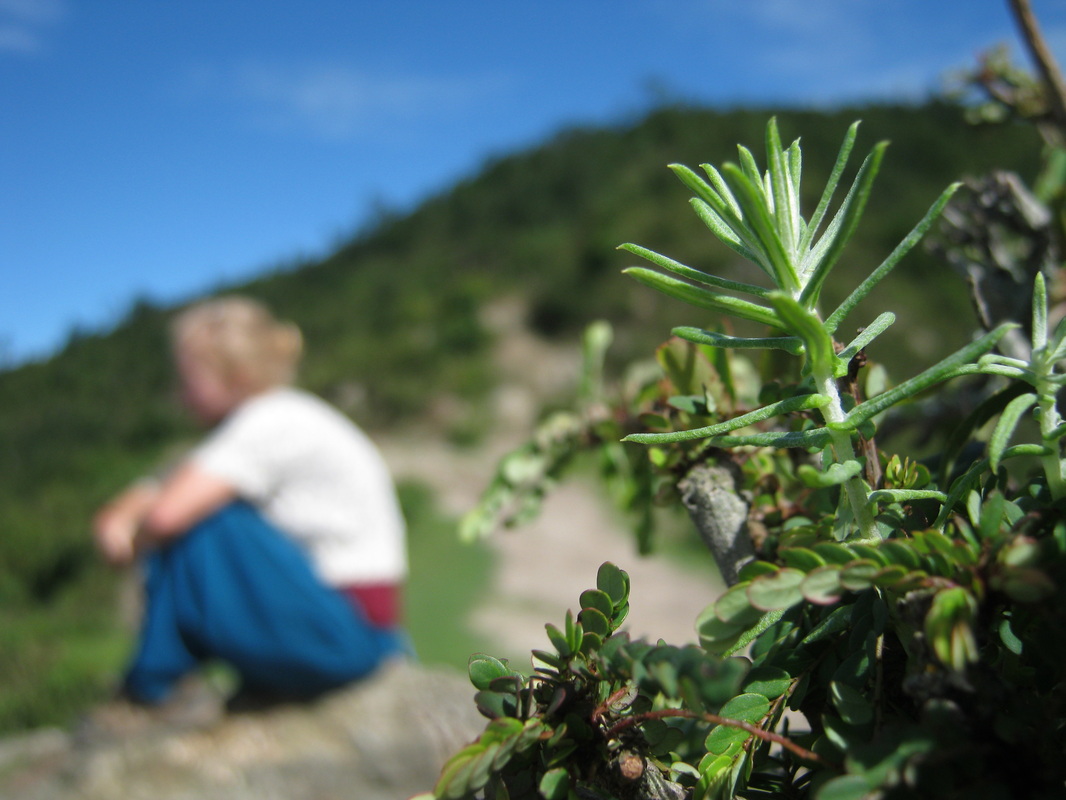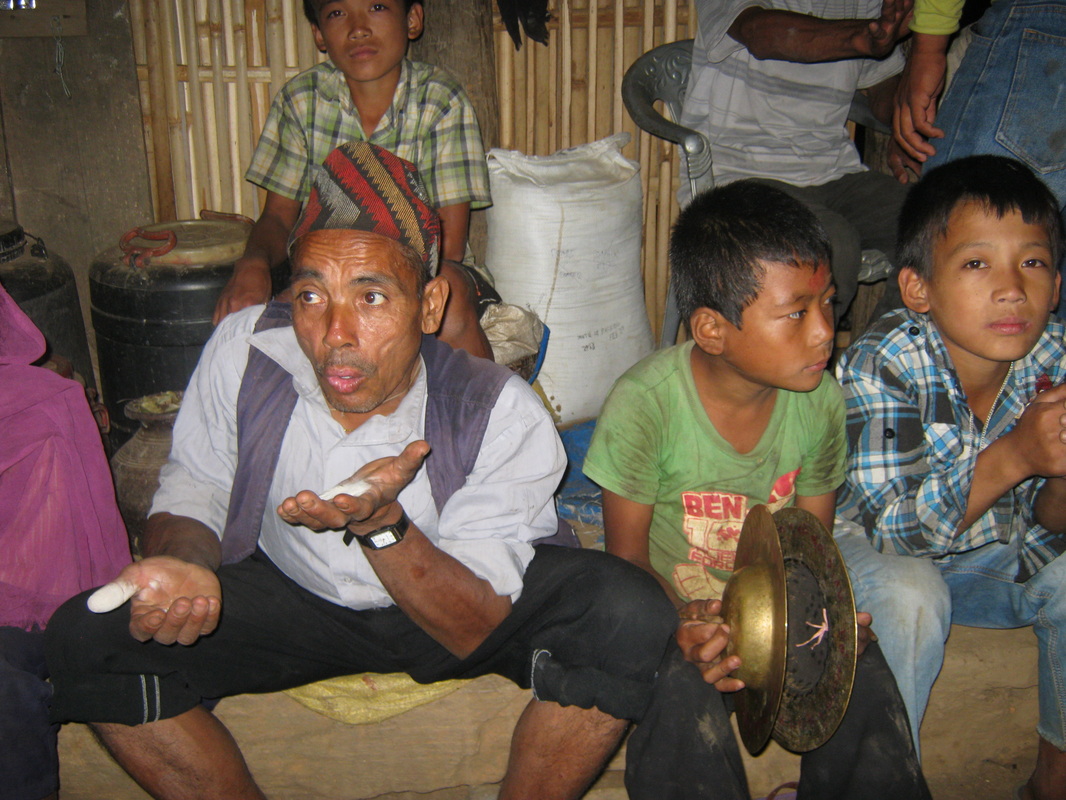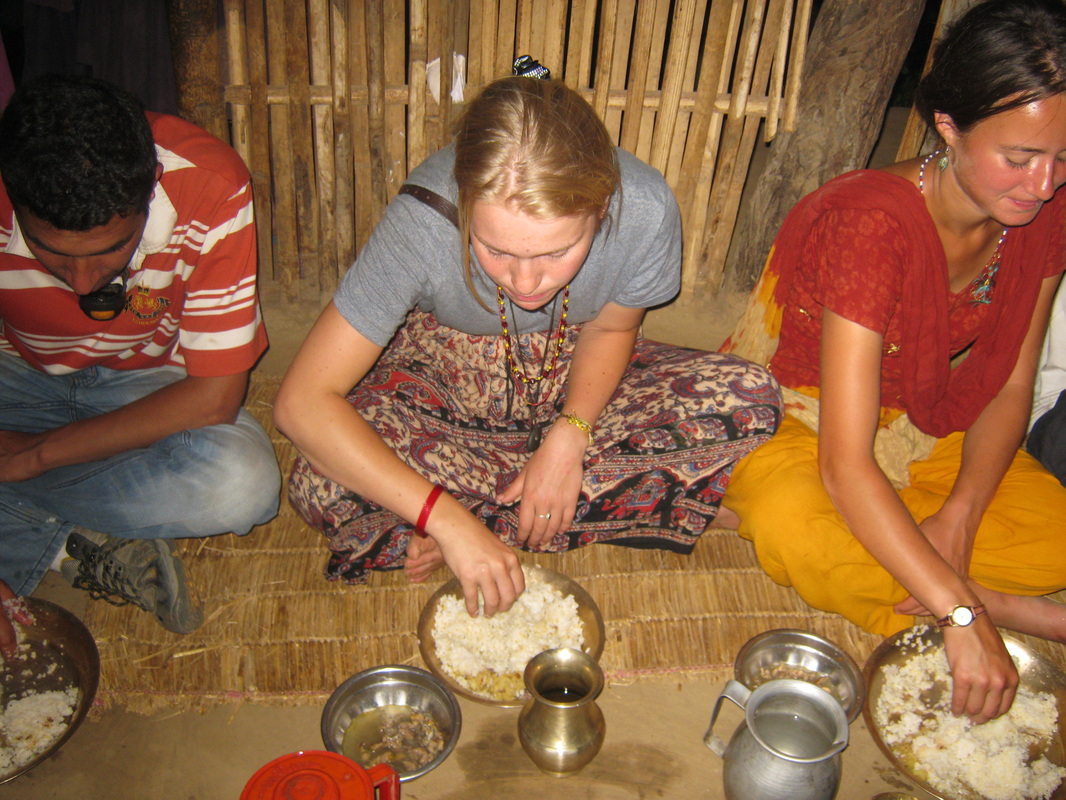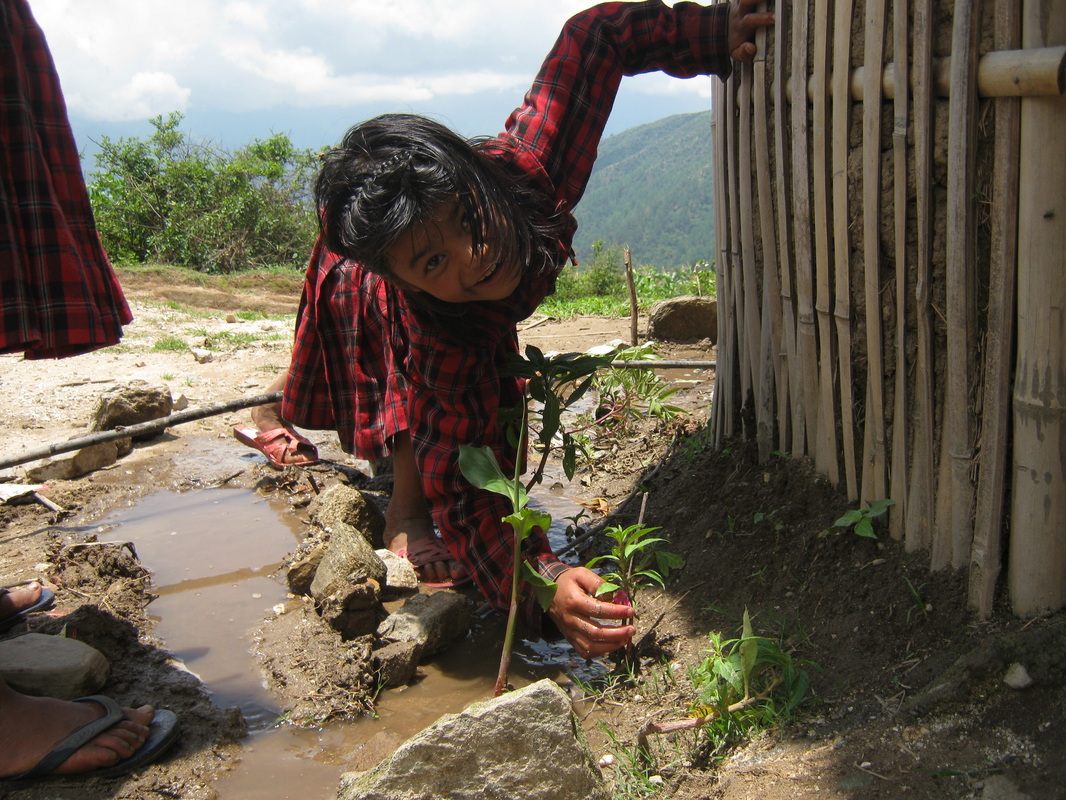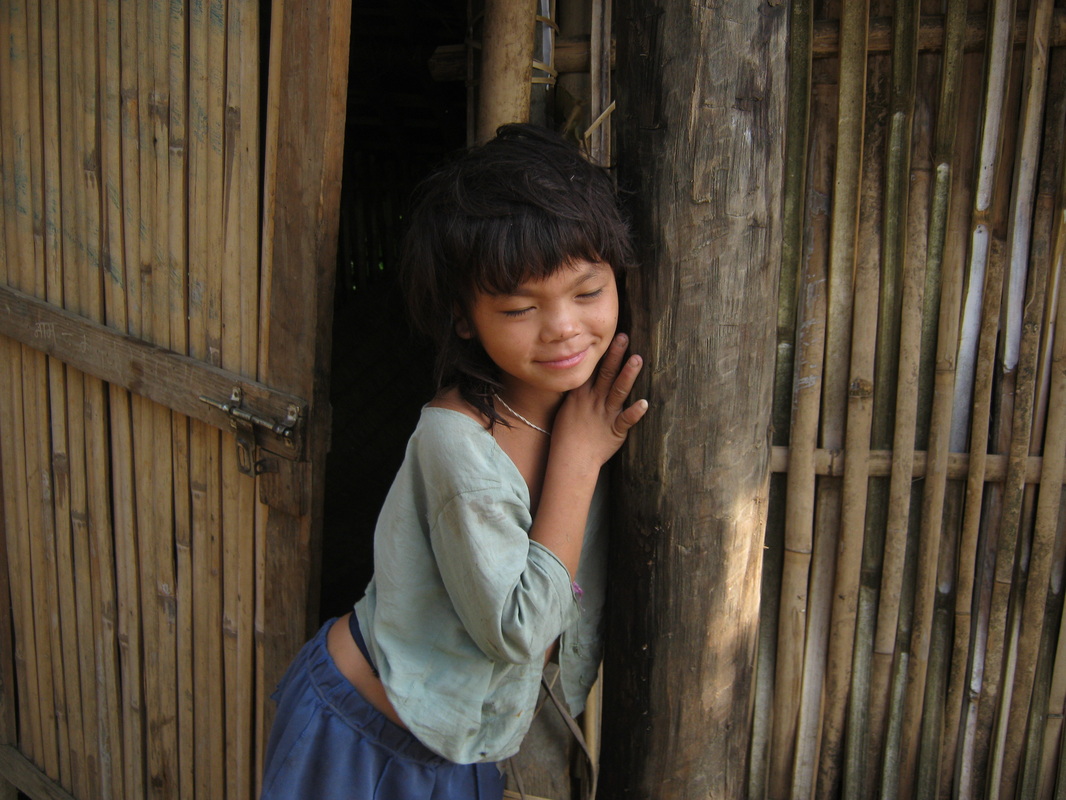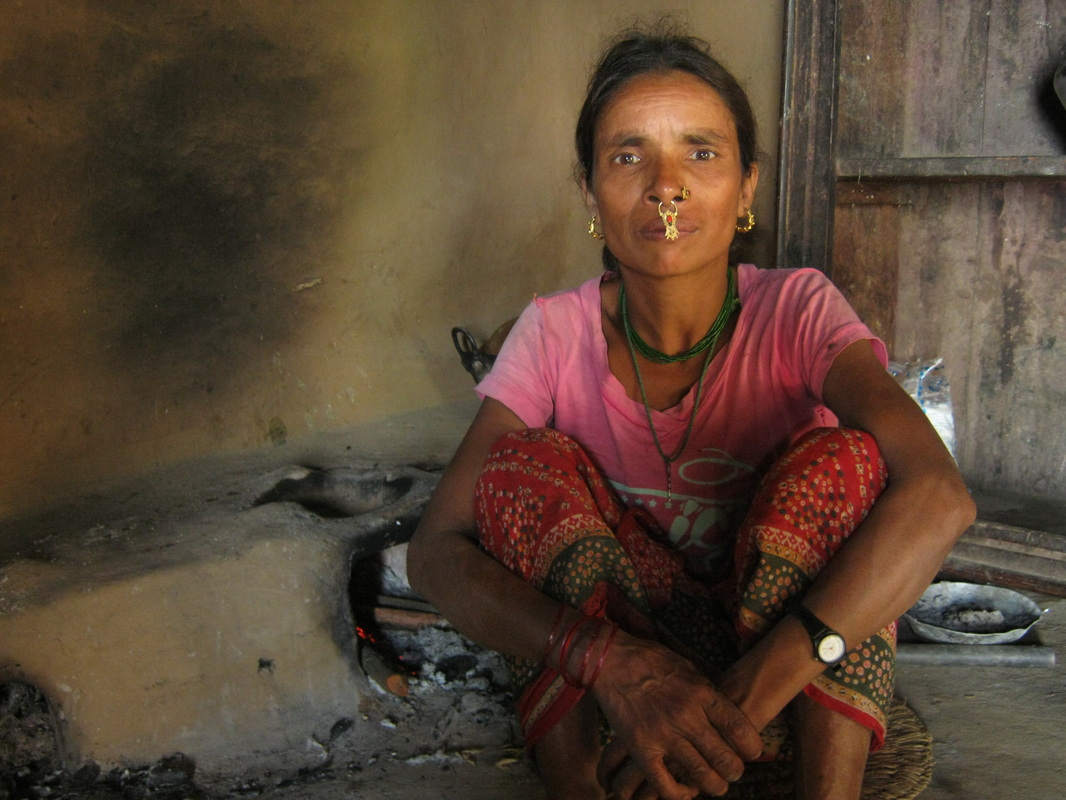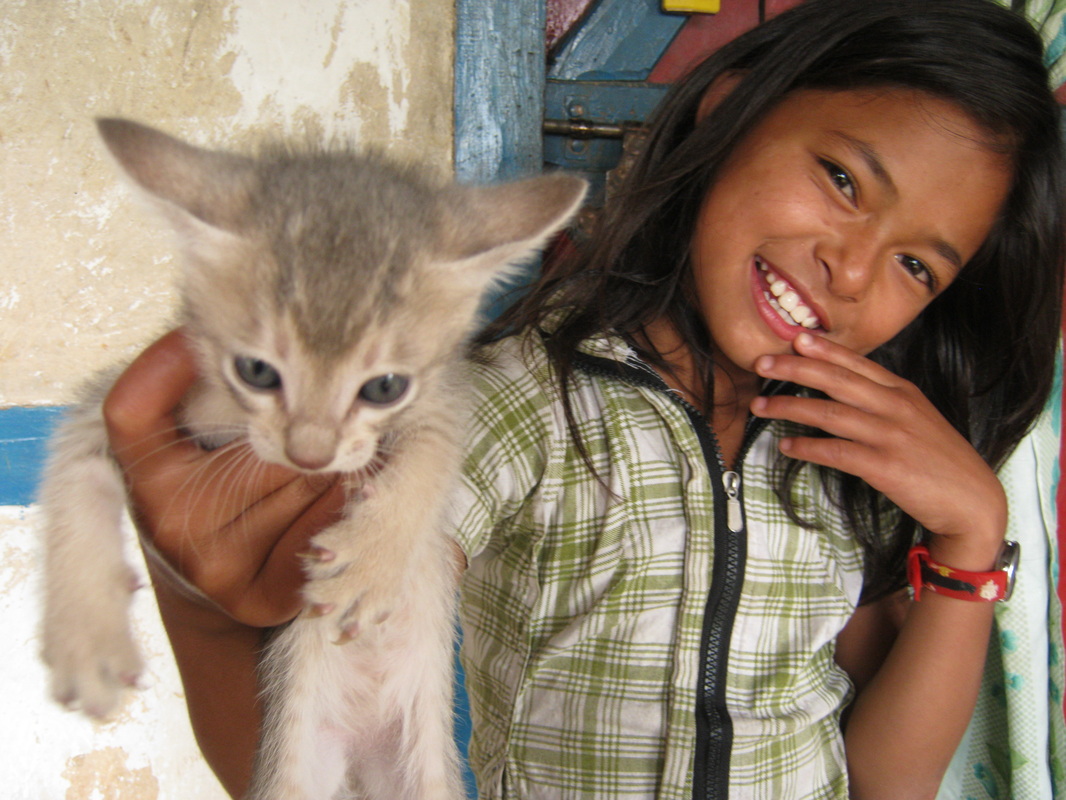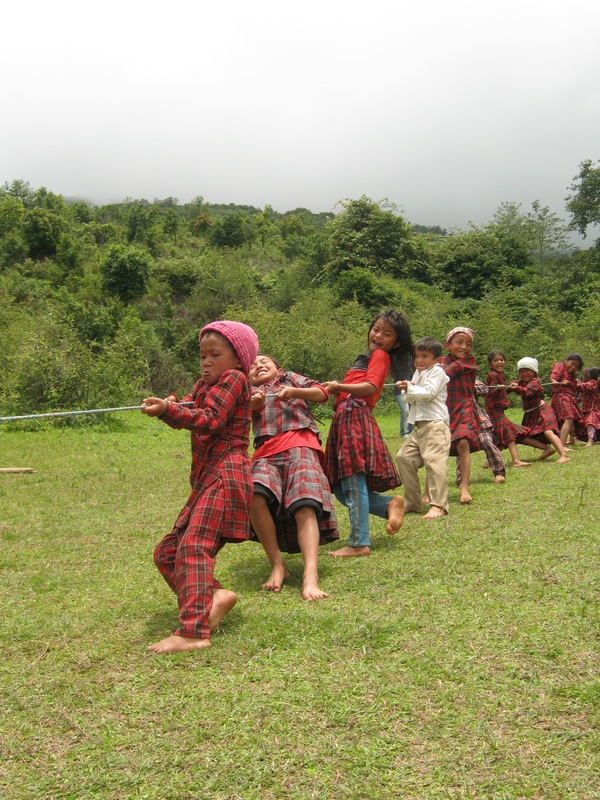Maya Soup
“Soup” is a playful interaction that sets the tone for the day privileging the child’s perspective. It is a complicated version of dodge ball in which there are three balls in play, and students playing against teachers. Because there are so many more students, the game begins with a group of students serving as allies to teachers. Once the game has thinned out to a more even number of teachers and students, the game becomes a contest between students and teachers. The rules are simple once you learn them: 1) You must pass the ball rather than run with it, although taking a few steps is permissible; 2) If the person you are targeting catches the ball, you are out; 3) If the person you target does not catch the ball and it touches her/him, s/he is out; 4) If you hit someone so hard that they cry, then you are out. (The two times I observed this happen, the offender put an arm around the victim and consoled him, even while the victim may at first have been pushing the offender away.) The school’s founders describe this game as an important leveling of the playing field—literally and metaphorically. As an observer, it was clear how the game performed this function. Teachers would run from students with delighted screams. Younger children were often the faster and nimbler players, both difficult to target and fast with the ball. Girls and boys cooperated, passing to each other as well as working equally hard to win against the teachers. Women and men also cooperated, with some of the women teachers using very successful strategies of playing wily defense early in the game only to change tactics when the competition thinned. Observing (and occasionally playing) this game every day for two weeks, I came to see this game as a wonderful metaphor for the school itself. As a form of organized chaos, there are many things occurring simultaneously, impossible to attend to everything at once. There is both playful competition and cultivated cooperation. Natural consequences follow any form of antisocial or unkind behavior. Careful observation and attention are valuable skills, as are assertiveness, cooperation, and risk-taking—when the opportunity presents itself. Anyone can participate, contribute, have fun, learn, improve, and win. However, winning is not the best part or the ultimate goal. It’s the playing that matters.
Virgin Unite Enterpreneurship | Student entrepreneurs run Nepal’s first free private schools
With huge school drop-out rates and half a million young workers leaving for low-skilled labour abroad, Nepal’s education system is in dire straits. Five youngsters who studied abroad came back to turn the tide.
You can be pretty sure you’re talking to a social entrepreneur when they start their story by saying:
“I used to be one of the kids that I was going to serve.” – Surya Karki
In Surya Karki’s case, that meant poor and without enough resources for a quality education.


In addition, the farm offers both students and parents and opportunity to learn. “We use the farm as a classroom”, says Karki. The children learn valuable agricultural skills and when the farm work is done, parents are invited to sit at the back of the classroom to listen in. There are sessions on diversifying crops, microfinance and sustainability.
We don’t believe money is power, but we are convinced that knowledge is power. This way, we empower the whole community.


FORBES | Citizen Action For Improving Government Accountability
 Joy Saunders notes that officials in Afghanistan cannot account for one third of official development aid money between 2002 and 2009. And as Saunders has witnessed through her work with Integrity Action, this corruption can deprive citizens from basic needs like health care, clean water, and education.
Joy Saunders notes that officials in Afghanistan cannot account for one third of official development aid money between 2002 and 2009. And as Saunders has witnessed through her work with Integrity Action, this corruption can deprive citizens from basic needs like health care, clean water, and education.
Take, for example, the story of the Noqra Road in the Injil District of Herat Province. Development money was allocated to the construction of the road, which was intended to serve 35,000 people. The contractor began construction on the road, but five months afterward, community monitors with Integrity Action’s partner organization, Integrity Watch Afghanistan, discovered serious discrepancies between what had been promised and what the contractor was providing; the road was only five meters wide, rather than the eight that were stipulated in the contract, and the quality of the road was poor.
Integrity Action is a network of over 468 partner institutions that enable citizen participation in measuring transparency, accountability, and outcome for development project governance in 26 different countries. They use technology to improve online data collection and reporting by citizens, such as with their latest tool, DevelopmentCheck.org, which collects findings and then disseminates the messages via community forums, social media, and radio. The organization is one of two Early Entry Prize winners of the Ashoka Changemaker’s “Closing the Loop” competition, which seeks to identify innovative solutions that are helping feedback loops to empower people, drive better decisions, and put resources where they’ll make a difference. The competition’s goal is to help citizens achieve better results in social services, philanthropy, and governance.
“We work with local communities and NGOs like Integrity Watch Afghanistan on the issues that matter the most to them—lack of access to health care, poor quality water pipes, insufficient waste removal, dangerous school buildings,” Saunders said. “We make sure that people are given a voice and that they are listened to. We train local people to monitor and gather evidence of service and infrastructure failings so they can talk with credibility as they present facts and figures to government staff and contractors. They then provide feedback on the availability of information, citizen engagement, and whether the service is being delivered effectively.”
In the case of the Noqra Road, the monitors compiled evidence and mobilized community protests and direct campaigning with the contractor, provincial council, and the governor’s office. In the end, the contractor rebuilt the road according to the terms of the contract.
Similarly, Surya Karki—the other Early Entry winner for the “Close the Loop” competition—is working directly with communities to pioneer a whole new system for community development in Nepal. With his Maya Universe Academy project, community members themselves design the three-pronged development approach, which includes an educational curriculum, community farming programs and agricultural microfinance, and investment in clean energy technologies. The most innovative part of the model? The communities themselves are co-owners of the business, with a 50/50 share model split between Maya Universe Academy and the community. So the community is as invested in the program’s success as the business is.
“We are a social business, reinventing the wheel for how businesses are run and how charity should be implemented,” Karki says. “In everything we have done and we will be doing, feedback loops are the most important aspect of our model. We started by providing free education to kids in poor villages, but our model—which includes the community and the parents in the education system—has an inbuilt feedback loop.”
Maya Universe Academy is called an “academy” because there’s also a skill share component built right in. Farmers trade volunteer hours at the school for agricultural, environmental, and marketing classes that enrich their professional knowledge.
The Maya Universe Academy has discovered that it is crucial for small rural communities to be co-creators and co-owners of development solutions, rather than allowing externally created solutions to be imposed on them. The communities experience economic and societal improvement that is much more profound when the communities themselves decide which crops to grow, what to teach the children, and which energy source the village should run on.
This is the fourth in a series of essays on the power and potential of feedback loops to dramatically increase the social benefits of development assistance (read the first one here, the second here, and the third here). It accompanies a call for projects related to feedback loops in an Ashoka Changemakers competition. This work is being catalyzed by Feedback Labs with support from the Rita Allen Foundation.
Come join us here.
AshokaU | Changemaker of the Week: Surya Karki
Co-founder Surya Karki featured on AshokaU.
Turn on your radio, turn on your radio
Read original on weikesadventurousadventures.weebly.com.
Have you ever been so completely out of touch with the modern world that you have no internet, no phone, not even a lamp to read a book by? Just the light of the skinny winny candles that you can buy in the local shop to make your evening last a little longer than 7 ‘o clock. I’m sure you have. But for me, it was the first time that I was staying in a place so remote from everything.I spent the last month in Udayapur, another Maya school in yet another district (they are spreading quite quickly-3 schools now), in a little village which -coincidentally- is also called Chisapani. The nearest town, Gaighat, is 4 hours down the hill by bus but in monsoon season you never know whether the bus will be running at all.
Remember the Udayapur kids I wrote about a few blogpost ago, who left to go back to their home after staying two months in the Tanahu school? Well, I went after them.
It was a wonderful welcome. After riding the bus up for some 5 hours (the last bus which went up all the way, lucky me-especially since I brought loads of school books) I got out at a Chisapani, and I discovered that nobody was there. It was almost nightfall. So I put down my bags and was just thinking where the school would be, when I heard my name being called ‘Weike miss!’. From afar I see Buddhap and Ramesh running my way.
‘Weike miss you are going to my house, ok?’ Buddhap says, ‘we have a party tonight!’. They showed me the house were I should put my stuff and off I went, into the darkening night with Buddhap and Ramesh on both my hands. After a few minutes we passed another village, and Roshani, Kamala and Regina (who turned out to be neighbors) come running out of their houses to give me a lot of big overwhelming and very happy hugs. As I’m trying to struggle myself loose from all the loving children, I see Rikke, Becky and Ashis Dai, the two volunteers and current ‘boss’ of this school, standing a bit further away.
Parties are there to be had, so a few minutes later all of us- the volunteers being led by the two children- set out for Buddhap’s house. Which turned out to be two hours away, halfway down the mountain.
Me, Becky and Ashis Dai eating some sunghur ko masu (pig meat)
But enough about parties and meat, how was the school, you ask? Well, the problem I have right now, after one month of no internet and no electricity, how do I start? One month is a lot of time to tell in one blog post, and to be fair, a lot always happens in a month’s time.
The school is wonderful. I was so happy to see these kids again, who I’ve lived with for two months in Tanahu, and they were (I hope, at least) also very happy to see me. But there is more. New admission ‘happened’ two months ago, so in addition to the 15 students that I already knew, there were some 30 more to get to know. And what students they are.
If I thought that Tanahu children were ‘rough’, Udayapur children are even more used to hard work, and they are probably ten times crazier too.
These kids really know how to make me smile. Imagine, I’m giving class, serious english class, and there’s a slug sliming its way up the clay wall of the classroom. ‘Look miss,’ Nishan says,’I eat slug, ok?’ and with one big gulp he swallows the slimy creature, after which he smiles at me broadly. ‘Tasty?’ I ask, and he nodds happily. ‘Another one!’ someone says, and as Nishan reaches for it to eat it I just manage to take it from his hand. ‘No eating during class’, I say.
Another class. French class to the A-class. I’m teaching them sentences that might be useful for them. ‘Je peux boire quelque chose?’ (can I drink something?), Je peux aller a la toilette (can I go to the toilet?) when Komala asks: ‘ Miss, how do you say ‘can I spit’ in French?’. I look it up in the dictionary. ‘Je peux cracher’, I say. ‘Madame, je peux cracher?’ she asks me. Smilingly I answer ‘bien sur’ and she goes outside to spit a nice flume on the pebble street. Then, excited by this new word, all the kids ask me the same question, and after class the street is covered with all different shades of spit. Lovely.
The B-class kids planting flowers next to their classroom
I love these kids, I love teaching, but I’m sure that if I only write about how wonderful teaching is you will not be reading this blog very much (neither would I) so I will see what else happened.
Thing is: There is no children boarding at this school, so after 4 o clock you’re pretty much free to do anything you want. Anything. You can play chess. You can read a book. You can gather firewood. You can cut firewood. You can build something out of bamboo. You can write in your journal. You can drink roxy. You can cook dinner, or go to one of the canteens and have someone cook dinner for you. And, most of all, you can listen to the radio.
Ashis dai and his radio are inseparable. After being in this village for the past three months or so he developed a routine of waking up with the radio, and going to sleep with it (many a night I heard him say ‘hajur, hajur’, to whatever the newsreporter had to say). By now, I know all the songs and advertisements of Kantipur FM. ‘Turn on your radio, turn on your radio, the sweet sounds you hear everywhere that you go, on your radioooo’.
Sometimes only books and radio wasn’t enough and I would get a kick out of just leaving with some of the children after school and sleep at their houses. By now, I’ve slept at Buddhaps, Parbatis, Kamalas and Roshanis house, which is always absolutely wonderful and interesting, too. Parbati, for example, didn’t even turn out to have a house at all when she invited me. Just a bamboo hut. I can sleep anywhere happily, bamboo hut or fancy hotel alike, but it just surprised me because Parbati is soo rich of mind, I expected her to be rich in means too. Me and my assumptions.
Tug of war during sports day
Anyway, time to go, I will write more about Udayapur when I go there again in a week, with my mom who arrived in Kathmandu two days ago. Hello mom:)
All pictures courtesy of weikesadventurousadventures.weebly.com.
Indiegogo | Advocacy Training Program in Nepal
Recently Surya Karki held a crowdfunding campaign on Indiegogo. He managed to raise the funds and will be teaching effective advocacy techniques to the educators and administrators of Maya Universe Academy in Nepal. Keep posted to this blog for updates on this project.
BEdition Magazine | Bearing Witness to Global Citizenship Education in Nepal
From http://beditionmagazine.com/bearing-witness-to-global-citizenship-education-in-nepal/. By Shelane Jorgenson, PhD candidate, ’09 MEd, ’05 BA
Climbing up the mountain to Maya Universe Academy (MUA) is like entering a different time and space. Not in the past, as you might imagine a small rural school in the Tanahun District of Central Nepal to be, but rather the future. As a Doctoral candidate in Educational Policy Studies at the University of Alberta, Canada, I have studied and observed education systems around the world, but no form of education has captured my heart to the extent of MUA in the village of Udhin Dhunga, Nepal has. Though I spent only a few days at the school, I was greeted with open arms of the staff, volunteers, students and broader community like I was a family member returning home. It was not by any plan or aspiration to go to the school that I ended up there, but by some divine karmic path to show me the potential of education.
After spending a month at Oneness University in India, I came to Nepal at the beginning of May to visit a friend in Kathmandu whom I had met on a flight 13 years ago. In accordance with extraordinary Nepali hospitality, I was welcomed into the family and a seemingly endless network of family and friends that have guided and accompanied my journey. Knowing that I am interested in education, my friend set up an opportunity for me to visit MUA, which was started by his nephew, Manjil Rana in 2010. The Academy, which I learned is the first and only free non-government school in Nepal, is a non-profit, community and volunteer-run organization with about 60 students and growing daily. In response to the growing number of enrollments and seeing the need for free non-government education in other regions of the country, two more schools have since opened. One in the rural village of Chisapani, and another in the Syangja district of Nepal.
Maya, which means love or friendship, is a perfect depiction of the energy and spirit of MUA. After the long journey to the school (about a 5 hour bus ride, one hour jeep ride and one hour hike up a mountain) from Kathmandu, I was instantly welcomed with smiles and conversation with the children, foreign volunteers and devout staff that work tirelessly to maintain and sustain the operation and vision of MUA. The mission of the Academy is to “embrace social responsibility and creative-mindfulness to educate and inspire our students and their families to build community, gain greater independence, and transform their lives.” A tall order for a rural school operating on revolving door of volunteers, few staff and little funding. If you were to tell me a month ago that a school in a rural village in Nepal is providing free education, and in some cases boarding, to underprivileged kids without any government or NGO funding base, I would not have believed you. However, in three days, my world and ideas about education were forever altered.
The most integral insight I gleaned in three days was about passion and compassion. MUA was developed through the compassionate heart of its founders. Recognizing the deficiencies of government schools that were not meeting the needs of students and unaffordability of private schools, which are unattainable to the majority of Nepalese people, the founders saw a need for quality education that was also free of cost. Their compassion for underprivileged children and providing them with equal opportunities for quality primary education, called upon a network of local and international volunteers to make their vision a reality. It is with great passion that I see volunteers and staff working to sustain this vision. In order to make this a reality, families of MUA students are asked to volunteer two days a month undertaking tasks such as building classrooms, cooking, gardening and daycare in exchange for their children’s education. Everywhere I looked, there were educational spaces being opened through informal learning. Foreign volunteers were learning how to speak Nepali, how to build classrooms and toilets using local knowledge and materials, local gardening, farming, cooking techniques and more. Reciprocally, the local Maya community was learning from the experience and knowledge of its foreign volunteers. While I was at MAU, French and Theatre classes were developed and delivered by two young French volunteers based on their knowledge and experience being theatre majors in their home university. Mutual and reciprocal learning from the local to the global fuels growth for all Mayan community members in multiple ways- personal, intellectual, community and spiritual. I have never in my life seen such a committed and passionate group of volunteers, whose hearts and spirit are intrinsically tied to the Maya community.
The local and global connections of inter-cultural education are the subject of my doctoral research. As people from different parts of the world come together, there are tremendous possibilities for global citizenship- some encouraging for the potential of interactions to foster relationships and care for others beyond borders, but there are also risks in the ways that knowledge transmission is undertaken. I have come across too many educational programs that foster a one-way traffic of privileged North American or European students traveling to the global south to embark on a short international visit and returning home without learning the language or ways of their hosts. Global citizenship emerging from such one-way practices perpetuates many of the colonial trends that maintain inequitable power relations. The global citizenship education that I bore witness to at MUA was possibly the most genuine and encouraging that I have had the privilege to encounter. Maya students, most who have never been beyond the hills of their village, are receiving a global education that the volunteers from countries such as Holland, Malta, Malaysia and Korea, are bringing to their lives inside and outside of the classroom. Reciprocally, the foreign volunteers are learning and living the reality of a remote mountain village, where water is fetched daily from a nearby spring, eating food that one grows and is cooked on an open fire, and as one volunteer stated, “having little access to the outside world,” without internet or other media readily available. Yet, in the world of MUA, the conditions of rural living are embraced with great cooperation and humility. Everyone, learning, growing, becoming global citizens.
The community of Dhunga recognizes the power of education and the wonderful opportunities that are afforded to their children at no monetary cost. This is reflected in continual requests for enrollment and parents showing up more than their required 2 days to volunteer. As the Mayan community grows to meet this demand through increased registration, expanding schools, hiring staff and hosting volunteers, donations to sustain their vision and dream are paramount. If you want to be involved and support the Mayan community to educate and inspire students, their families and volunteers for social development and fostering global citizenship, please visit http://mischwald.ch/mayauniverseacademy/get-involved.
The Kathmandu Post | Portrait
Chairman Rana featured in The Kathmandu Post.
 Read full article → http://epaper.ekantipur.com/ktpost/showtext.aspx?boxid=1327962&parentid=24026&issuedate=2962013
Read full article → http://epaper.ekantipur.com/ktpost/showtext.aspx?boxid=1327962&parentid=24026&issuedate=2962013
Teenz | CHARITY BEGINS AT HOME

Chairman Rana was featured in Teenz “A League of Incredibles”
There is a certain amount of moral fiber one requires to dream, but even more so to make someone else’s dreams come true. Heaven definitely has a place reserved in the name of Manjil Rana. This young man has abandoned his studies in the U.S., stripped himself off of all of societal wishes, and stepped into the world of providing education to the poor and underprivileged. His first project, Maya Universe Academy, Tanahu, where they follow the Maya Model- free education in return for 2 days of volunteering from the parents has become a tremendous success. People from nearby villages have begun sending their kids off to school and there is a positive change in the air around the villages. We asked him where the inspiration for his work came from, to which he replied” I believe in moving with the flow of the universe with a good heart and a smart head.”
Most people, no matter how smart and loyal to their country, sit around complaining about how the country is being run, none of us stand up and willingly become part of it, Rana believes that the revolution will finally begin the day the children in his school graduate. He has full faith in the children and the bright future ahead of them. When asked to describe himself, he says ‘I’m a dreamer’, and one that turns them into an enchanted reality.
Apart from being the 24 year old man who brought about a revolutionary change in the pre existing idea that we are ‘too young’ for greatness, he is also just a regular boy who enjoys an occasional drink with friends, travelling and meeting new people. There is not a moment of silence with Rana, no matter how long you’ve been around him for. He could discuss anything from social work, economics, philosophy and when it comes to politics, he is a man of a hundred opinions.He claims he would have loved to be a politician if not a youth movement leader. His future ambitions include sustaining his project in a number of ways, such as launching products in the city to help out the parents of the children studying in his school and gathering likeminded youth from Kathmandu to come and volunteer in the villages. He further adds, “I think I can definitely become a change maker in my field, life is like a long poem with never ending words, and I think I already added a few verses.”
Read more at http://teenz.com.np/article/archives/a-league-of-incredibles.html
 Maya Universe Academy, Nepal
Maya Universe Academy, Nepal






